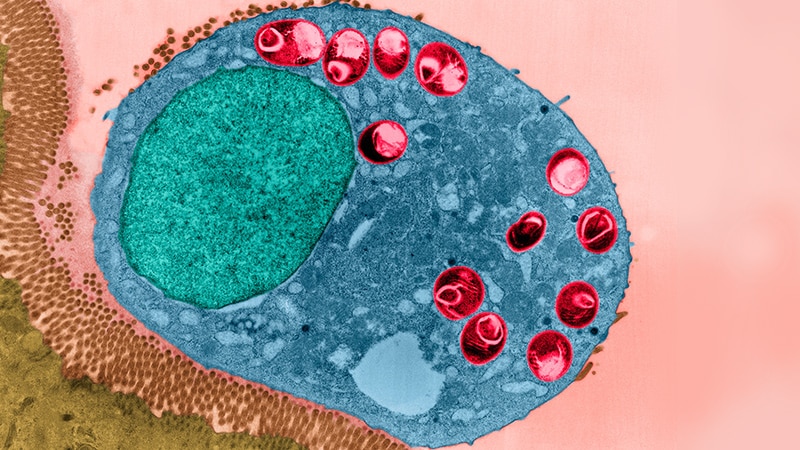
LYON, France — Faced with a young male transplant patient who could only be saved with fumagillin, an antiparasitic that is no longer produced, multiple teams at Lyon Civilian Hospitals (HCL) set out to make the treatment again.
Fabrice Pirot, PhD, PharmD, pharmacist and head of Fripharm, the hospital and university pharmaceutical manufacturing, research, and innovation platform of the Édouard-Herriot Hospital pharmacy in Lyon, explained the treatment to Medscape Medical News. "Fumagillin is a treatment from the past that ensures a future for our patients." Thanks to an exceptional surge of support, Fripharm was able to re-create the drug and save 28 patients across France.
In 2020, Noémie Laverdure, MD, PhD, a physician in the Pediatric Hepatology, Gastroenterology, and Nutrition Department at Lyon Maternity Hospital, was confronted with repeated transit problems in a 15-year-old liver transplant patient named Raphaël. Tests conducted by Meja Rabodonirina, MD, PhD, a biologist specializing in parasitology, revealed that the patient was infected with a fungus from the microsporidia family: Enterocytozoon bieneusi. This fungus causes severe diarrhea that can be life-threatening in immunocompromised patients like Raphaël. The only possible treatment to cure it is fumagillin, an antiparasitic that has been used since the 1950s.
Stocks Were Depleted
The problem was that production of this medicine had stopped in 2019, and HCL's last stocks of fumagillin had been used up in March 2020. So, a support network consisting of multiple HCL departments, the French National Reference Center for Microsporidiosis at Clermont-Ferrand University Hospital, and the Fripharm pharmacists was set up. They were asked to find raw material to produce this treatment again.
"We contacted suppliers in India, China, and Europe," Camille Merienne, PharmD, PhD, pharmacist in charge of the Fripharm control laboratory, told Medscape. "We searched the entire world to try to find a stock of active material!" In the end, the team learned that a stock of 300 g of raw material slated for destruction was available in Hungary. "We were able to identify a production site that had this last remaining quantity. They agreed to deliver the raw material to us. We would not have been able to do anything without their help."
Customized Medicine
Because the molecule of the active ingredient is extremely sensitive to light and heat, it was kept at −80 °C (–112 °F) during transport. With this raw material, the Fripharm pharmacists produced a customized medicine in the form of an oral suspension. "We had three patients in Lyon who were in critical condition. One of them died while we were finding the raw material. As for the other two, the parasite disappeared from their stool after 15 days of treatment. Their intestinal mucosa recovered after one month, and their intestinal transit returned to normal after 3 months," said Pirot.
The news subsequently spread, and other patients in Lyon, Grenoble, Clermont-Ferrand, Paris, Bordeaux, Rennes, and Nantes were able to receive treatment, thanks to the fumagillin produced by Fripharm. "Over the course of 18 months, we were able to treat 28 patients," said Pirot.
Ensuring Continued Production
But the 300 g of active ingredient recovered in Hungary will not last forever, and the platform's pharmacists are concerned about ensuring that this production continues. "The next steps are to enter into a partnership with an active ingredient producer. Once we have achieved this, we will be able to prepare the medicine," Pirot told Medscape. Two chemistry laboratories have already shown interest. "We are currently in the process of conducting feasibility tests. Next, we will have to calculate the costs, then find the funding. When we have the raw material, we will be able to once again produce the medicine in France, and even offer it to other European pharmacies."
"The fumagillin that we have succeeded in recreating at HCL is critically important. Without this remedy, immunocompromised patients, including all transplant patients infected with microsporidia, have almost no chance of surviving. We have to find solutions by any means, whether with the public authorities or in the private sector. It is inconceivable not to save patients when we know how to," said Rabodonirina in a press release.
This article was translated from the Medscape French edition.
For more news, follow Medscape on Facebook, Twitter, Instagram, YouTube, and LinkedIn
Read Again https://www.medscape.com/viewarticle/977962Bagikan Berita Ini














0 Response to "French Hospitals Manufacture Discontinued Drug to Save Lives - Medscape"
Post a Comment